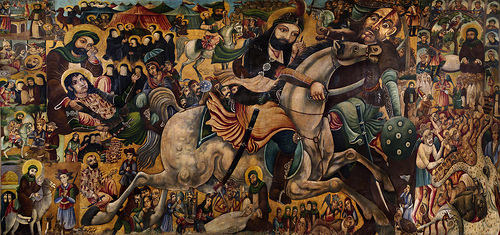 The Economist reported recently on the state of Sunni-Shia relations only a few years after a seemingly pivotal moment:
The Economist reported recently on the state of Sunni-Shia relations only a few years after a seemingly pivotal moment:
It seemed historic. Muslim scholars, 170 in number and representing nine schools of legal thought (including four main Sunni ones and two Shia), gathered in Amman and declared that, whatever their differences, they accepted the others’ authority over their respective flocks. Implicitly, at least, they were renouncing the idea that their counterparts were heretics. Some called that meeting in Jordan in 2005 the biggest convergence since 969, when a Shia dynasty took over Egypt.
In spite of continued efforts by those religious leaders that gathered in 2005, the magazine relays that “seen from the outside, feuds between Sunnis, who make up roughly 80% of the world’s Muslims, and the Shia minority (most of the rest), remain savage and are, in some ways, worsening.” Among the reasons cited for this deterioration are a decreased Western presence in Iraq and the ongoing transformations of the Arab Spring:
Paradoxically enough, one reason for the worsening in intra-Muslim relations is the declining role of the West. At the time of the Amman gathering in 2005, Iraq was in the grip both of horrific Sunni-Shia violence and of American occupation. It was possible to convince ordinary Muslims (however unfairly) that America was to blame for stoking this tension; and that, for dignity’s sake, followers of Islam should stand together against the outsiders’ game of divide-and-rule. Now the American occupation of Iraq is over, and hatred between Sunnis and Shias there has a ghastly momentum of its own: the Shia prime minister, Nuri al-Maliki, has accused a Sunni vice-president, Tariq al-Hashemi, of complicity in terrorism and forced him to flee. On April 30th he was charged with multiple murders.
But perhaps the biggest change is that Sunnis think they are now winning the global contest. Seven years ago it seemed that Shia Islam, whether in Iran, Iraq and Lebanon, was on the march. Hot-headed Sunnis who yearned to see a government or movement that would confront Israel in the name of Islam had to find role-models across the sectarian divide, in Iran, or in the mullahs’ Lebanese protégés in Hizbullah.
These days zealous Sunnis need no longer look to swashbuckling Shias for inspiration. The real action is unfolding in their own homelands, at least in north Africa or the Levant. Nor need they look abroad for political ideology: the Arab spring has established the Sunni sort of political Islam as a powerful, domestically based force that has emerged from the underground or from exile. Rachid Ghannouchi, for example, Tunisia’s best-known Islamist, has returned from London to become probably the most powerful figure in the land. Vali Nasr, a professor at the Fletcher School of Tufts University in America and a former adviser to the Obama administration, says that—rightly or wrongly—Sunnis believe that Western sanctions are weakening Iran, and that the combined efforts of Sunnis and the West will also topple Iran’s only Arab ally, Syria. From a Sunni perspective, these impending victories outweigh the travails of their co-religionists in majority-Shia Iraq.
Read more here.












